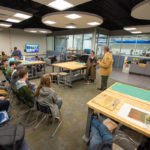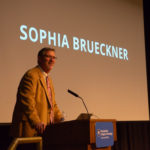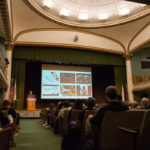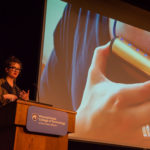



 “I’m so impressed with what good makers you are!” Sophia Brueckner said at the start of her Technology & Society Colloquia Series talk in the Klump Academic Center Auditorium.
“I’m so impressed with what good makers you are!” Sophia Brueckner said at the start of her Technology & Society Colloquia Series talk in the Klump Academic Center Auditorium.The futurist artist/designer/engineer toured the Pennsylvania College of Technology campus Thursday, addressed a small afternoon gathering of mostly industrial design and graphic design students and faculty in The Dr. Welch Workshop – A Makerspace at Penn College, and delivered her keynote address, “Prototyping Alternative Futures,” to a crowd of college and community attendees in the evening.
Hailing from a family of “old car lovers,” Brueckner mentioned she especially enjoyed the college’s automotive restoration lab during her campus journeys. An assistant professor at University of Michigan’s Stamps School of Art & Design, the futurist detailed her love and distrust of technology from her childhood through a career that has included work as a software engineer at Google.
“I want to inspire you to cultivate a critically optimistic attitude toward technology,” she said. In navigating between utopian and dystopian views of technology and society, Brueckner recommends science fiction as an excellent medium for exploring the scale and effect of possible designs.
Brueckner challenged her audience of young makers to “think about every small design choice you make” and consider how the design might eventually negatively impact users. “We are all cyborgs,” she added, advising the audience to consciously disentangle themselves from their electronic devices at regular intervals.
Brueckner is attempting to flip the current paradigm of data being gleaned from users for the benefit of advertisers by creating social support networks that meaningfully benefit only the user.
“Instead of harvesting data and sending it elsewhere, we should take back control of our cyborg evolutions,” she declared. As an example, she envisions a wearable device that can be programmed to emanate warmth on the shoulder of the user when the sun is shining in his or her favorite place (a childhood home, for instance) or an “empathy box” placed in the waiting room of a counseling center where patients can interact with it, feeling the warmth of other anonymous users in various locations around the world. “We can create physical interfaces that can have a powerful impact on our mental health and wellness,” she added.
In a clear example of how the speaker stirred the audience’s futuristic notions, a student asked her about the possibility of creating a device to benefit a young family member struggling with a disability.
In closing, Brueckner requested her audience to consider: “How can my work change what people think is possible?” A reception in Wrapture followed the presentation.
